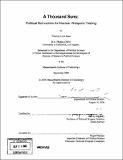A thousand suns : political motivations for nuclear weapons testing
Author(s)
Raas, Whitney
DownloadFull printable version (5.886Mb)
Other Contributors
Massachusetts Institute of Technology. Dept. of Political Science.
Advisor
Harvey Sapolsky.
Terms of use
Metadata
Show full item recordAbstract
Nuclear weapon testing is the final step in the nuclear development process, an announcement of ability and strength. The consequences of a nuclear test are far from easy to bear, however: economic sanctions can be crippling and nuclear capability automatically makes one a nuclear target. Why, then, do states test nuclear weapons? This thesis aims to determine the answer to this question using India as a model. It is well known that India tested nuclear weapons in 1974 and in 1998, but less well known are the near-tests of 1983, 1995, and 1996. This thesis examines the situation in these years and the details of the nuclear decisions based on four hypotheses: technical concerns, security and power, domestic politics, and norms and ideas. This study shows that while all four of these theories play a role, technical concerns (contrary to popular belief) are very minor portion of the overall decision to test a nuclear weapon and are relegated to an excuse for scientists. Domestic politics, especially the political fortunes of those in power, play a large role, especially when combined with real, existential security concerns. Similarly, the prestige and status that leaders believe is imparted by nuclear ability is of major import. Understanding the reasons for nuclear testing will lead to fewer nuclear surprises in the future and may help to address the concerns of the growing number of states with latent nuclear capabilities.
Description
Thesis (S.M.)--Massachusetts Institute of Technology, Dept. of Political Science, 2006. Includes bibliographical references.
Date issued
2006Department
Massachusetts Institute of Technology. Department of Political SciencePublisher
Massachusetts Institute of Technology
Keywords
Political Science.